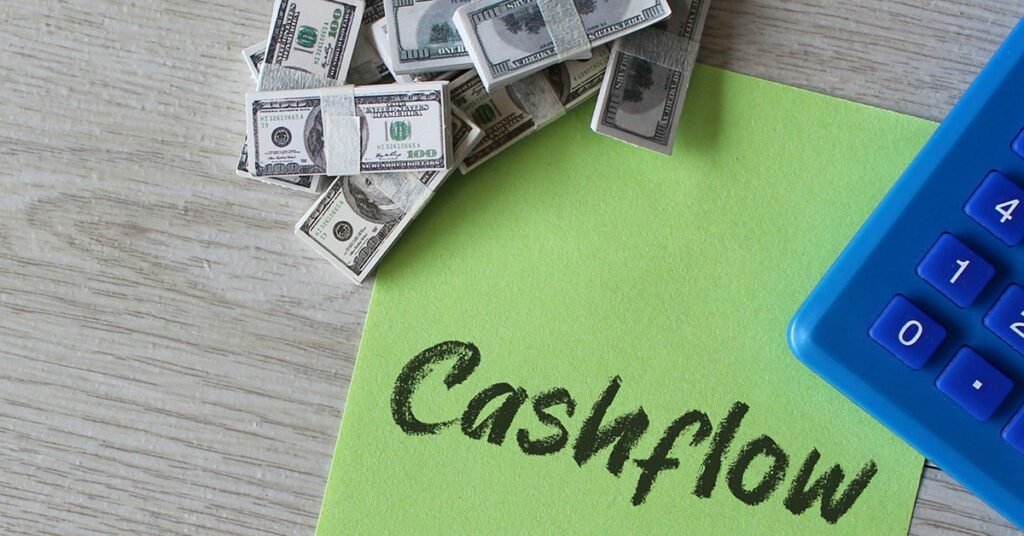In the pursuit of financial success and prosperity, one of the most crucial mindsets to adopt is that of cash flow thinking. Understanding and managing cash flow effectively can be the cornerstone of building wealth as an individual.
Cash flow is not just about how much money you make, but also about how you manage it. Let me explain why cash flow thinking is crucial if you want to become wealthy, reach your financial goals or simply learn how to manage your money wisely.
What is Cash Flow?
Cash flow is basically the money coming in and going out of your bank account. It is the heartbeat of your finances. It’s not just about how much money you have; it’s about how that money moves in and out of your account over time. You can imagine your finances as a river: cash flow is the flow of water, with income being the water coming in and expenses being the water going out. Just like a river, your cash flow can be steady or jump up and down, depending on various factors.
In order to understand cash flow, you have to look at both your income and expenses. Income includes sources like your salary, freelance work, rental income, or perhaps dividends from a stock investment. On the other hand, expenses encompass everything you spend money on, such as bills, and mortgage payments, entertainment, and savings.
By looking and understanding your cash flow, you will gain insights into your financial health. You can identify patterns, such as when you tend to earn more or spend more, and make adjustments accordingly. For example, if you notice that you spend more than you earn every month, you may need to cut back on non-essential expenses or find ways to increase your income.
Cash flow thinking is about being proactive and intentional with your finances. It’s about being aware of where your money is going and making decisions that align with your financial goals. With a clear understanding of your cash flow, you can make informed choices that lead to greater financial success.
Why Cash Flow Thinking Matters
There are several compelling reasons for why cash flow thinking matters if you want to be successful with your money. Let me explain it for you, and hopefully it will all make sense.

1. Know Your Money
Cash flow thinking helps you understand where your money comes from and where it goes. It’s like having a map for your finances. When you know this, you can make better decisions about how to use your money wisely.
2. Plan Ahead
It’s like planning for a trip. When you know how much money you have and how much you need, you can plan your spending better. You can set goals for saving money or buying things you want.
3. Stay Prepared
We all know that life can throw surprises at us, like unexpected bills or emergencies. When you know your cash flow, you can save up for these moments. Think of it like having an umbrella for a rainy day.
4. Spot Opportunities
Cash flow thinking helps you see where you can make more money or save money. Maybe you notice you’re spending a lot on something you don’t really need. Or you see a chance to make extra money with a side hustle. It’s like having a treasure map for finding ways to improve your finances.
5. Manage Debts
With cash flow thinking, you can manage debts better. You can make a plan to pay off debts and avoid getting into more bad debt. Think of it like being a captain of a ship. You can easier steer away from rough waters if you see where you’re going.
6. Live Your Best Life
Cash flow thinking helps you design a lifestyle that fits your financial goals. You can make choices about how you spend and save money to live the life you want. As being the architect of a dream house, you can be the architect of your dream life.
7. Freedom
What cash flow thinking ultimately gives you is, freedom. When you understand your money and how to manage it, you have more control over your life. You can chase your dreams and do what makes you happy without worrying about money all the time.
Learning cash flow thinking is like learning a superpower. It gives you the tools to master your money and create the life you want. So, if you want to be successful and achieve your goals, cash flow thinking is the key to victory!
How to Master Cash Flow Thinking
Mastering cash flow thinking is like learning to ride a bike – it takes practice, but once you get the hang of it, you’ll feel like you’re flying!

1. Get to Know Your Money
Think of your money like a new friend – you want to get to know it inside and out!
Start by tracking your income and expenses. You can use a budgeting app, spreadsheet, or even just a notebook to jot everything down. Write down how much money you make each month and where it’s coming from, whether it’s from work, side hustles, or others sources. Then, track your expenses by writing down everything you spend money on, from bills and groceries to movie nights.
2. Set Financial Goals
Just like when you’re planning a road trip, it’s important to have a destination in mind when it comes to your finances. Sit down and think about what you want to achieve financially. Do you want to save up for a vacation, buy a new car, or pay off debt?
Whatever your goals are, write them down and make them specific and achievable. This will give you something to work towards and keep you motivated along the way.
3. Create a Budget
Now that you know how much money you’re making and what your goals are, it’s time to create a budget. Think of your budget as a road map for your money – it tells you where to go and what to do with it. Start by listing all of your expenses, from fixed costs like rent and utilities to variable expenses like groceries. Then, allocate your income towards these expenses, making sure to prioritize your financial goals. Don’t forget to leave some wiggle room for unexpected expenses or fun treats!
4. Build an Emergency Fund
We all know that life is full of surprises, so it’s important to be prepared. Set aside some money each month to build up an emergency fund. Aim to save at least three to six months worth of living expenses in a separate account. This will give you peace of mind knowing that you have a financial cushion to fall back on if something unexpected happens, like a car repair or buying a new refrigerator.
5. Pay Off Debt
When it comes to maximizing cash flow, investing money with a higher return can often be more beneficial than paying off debt, especially if the return on investment(ROI) outweighs the cost of debt. Every coin spent on paying off low-interest debt is a coin that could have been invested for higher returns. Investing allows you to maintain liquidity and flexibility with your finances. While paying off debt reduces your debt burden, it also ties up your money in the short term. Investing gives you the option to access funds when needed while still earning returns on your investment.
6. Invest Wisely
Once you’ve got your finances in order, it’s time to put your money to work for you.
Consider investing in stocks, bonds, or real estate to grow your wealth over time. Start with low-risk investments and gradually diversify your portfolio as you become more comfortable. Remember, investing is a long-term game, so be patient and stick with it.
7. Stay Consistent
Like learning any new skill, mastering cash flow thinking takes time and practice. Stay consistent with your financial habits, keep tracking your cash flow, and revisit your goals regularly to make sure you’re on track.
Celebrate your successes along the way and don’t be too hard on yourself if you stumble – just pick yourself up and keep moving forward.
The Impact of Debt
Debt is a double-edged sword in personal finance – it can either work for you or against you, depending on how you handle it. Let’s break down the difference between bad debt and good debt in a way that’s easy to understand and, hopefully, brings a smile to your face!

The Good, the Bad, and the Funny Debt
Bad Debt
Picture bad debt as that sneaky monster hiding in your closet, ready to pounce when you least expect it. It’s money you borrow for stuff that doesn’t make you any richer, like splurging on fancy dinners or buying things you don’t really need. Bad debt often comes with sky-high interest rates, turning your financial journey into a wild, bumpy ride full of twists and turns.
Good Debt
Now, good debt is like having a trusty sidekick by your side – supportive, reliable and always there when you need a helping hand. It’s money you borrow for things that have the potential to make you richer over time, like investing in education or starting a business. Good debt comes with manageable interest rates and can actually help you boost your financial future, turning your financial roller coaster ride into an exhilarating adventure.
If you want to more about how to handle debt the right way. Feel free to read my other post, Managing Debt: Building A Strong Financial Foundation.
The Role of Cash Flow Thinking
1. Cash Flow Carnival
Cash flow thinking is like being the ringmaster of your own financial circus – you call the shots and keep the show running smoothly.
When it comes to debt, cash flow thinking helps you juggle your finances with ease. It shows you how bad debt can drain your cash flow faster than a leaky bucket and how good debt can fill your pockets with gold coins.
2. Risk vs. Reward
Cash flow thinking teaches you to weigh the risks and rewards of different types of debt.
It’s like deciding whether to ride the roller coaster with the steep drops or the gentle curves. With bad debt, you risk getting stuck in a financial loop-DE-loop, while good debt can send you soaring to new heights of financial success.
Fun ways of Investing in Good Debt
1. Real Estate
Investing in real estate is like playing Monopoly in real life – it’s a game of strategy and negotiation that can lead to big rewards.
Using good debt to purchase investment properties can provide a steady positive cash flow and potential appreciation over time. Just be sure to avoid the pitfalls of bad debt and keep your financial routine on track.
If you wish to learn more about Real Estate investing, visit my other article, Real Estate Investment: Strategies for Beginners.
2. Education
Investing in education is like going back to school for a master’s degree in financial comedy – it’s an investment in yourself that can pay off in big ways. Student loans may be a form of debt, but they’re also an investment in your future earning potential. With the right skills and knowledge, you can turn your financial routine into a blockbuster hit.
Understanding The Importance of Financial Literacy in High School and College Education is crucial for navigating the complexities of personal finance throughout life; for further insights, check out this informative article on the topic.
3. Business
Starting a business is like launching a comedy club in your garage – it’s a risky venture that requires dedication, creativity, and a healthy dose of optimism. Good debt can provide the capital needed to get your business off the ground. Just be prepared for the ups and downs of entrepreneurship and keep your sense of humor intact.
4. Stocks and Mutual Funds
Investing in stocks is like going on a roller coaster ride through the financial jungle – one minute you’re flying high, and the next, you’re in free fall. But with a bit of knowledge, you can navigate the ups and downs of the market like a seasoned pro.
For an easier ride you can turn to mutual funds which are like a buffet of investment options – you have a little bit of everything, from stocks and bonds to real estate and commodities. Investing in mutual funds is like having a professional chef create a gourmet meal for you – you get a diversified portfolio without having to do all the work yourself.
Diving into investing can be like jumping into a pool of unknowns, but don’t worry, we’ve got your floaties!

Mastering cash flow thinking is the key to unlocking financial success and achieving your goals. By getting to know your money, setting financial goals, creating a budget, building an emergency fund, handling debt, investing wisely, and staying consistent, you’ll be well on your way to financial freedom. So grab your financial bike and get ready to ride towards a brighter financial future!
If you’re interested in leaving a meaningful mark on the world and ensuring your efforts have long-lasting benefits, you won’t want to miss the compelling article “Crafting a Lasting Impact: Strategies for Building Your Legacy.” This piece is an essential read for anyone looking to create a personal or professional legacy that endures beyond their lifetime.

